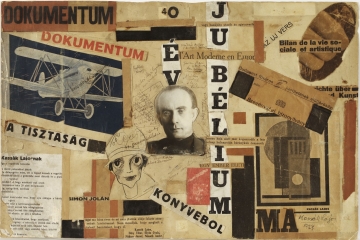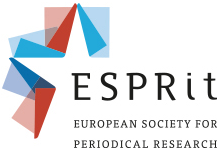ESPRit Online seminars 2022-2023
11th International ESPRit Conference (Leeds, 2023): Periodicals and Belonging
Call for Papers 11th International ESPRit Conference
Periodicals and Belonging
Time and venue: 27-29 June 2023, Leeds School of Arts, Leeds Beckett University, UK
Visit our website: https://www.leedsbeckett.ac.uk/events/conferences/11-international-esprit-conference/
The 11th International ESPRit conference will be held in Leeds, UK, on the theme of Periodicals and Belonging. This fruitful and timely theme is designed to encourage discussions and collaborations on the ways that ideas, emotions, declarations and imaginings, of belonging or not belonging, manifest in relation to periodical production and reception.
The notion of belonging to a family, a local culture, a national, regional and international group, or a diaspora, including a host of cultural and political ideas, is intrinsic to periodical studies, as is research on communities of authors/contributors, readers, literature and the arts, history, cultural history, linguistics, sociology and memory studies amongst other disciplines. Constitutive to belonging, is the notion of not belonging, and as such, we are interested in exploring themes of exclusion, forms of othering, racialisation, agonism and conflict.
The conference aims to further problematise concepts of association and organisation such as communities (e.g. ‘imagined communities’, ‘interpretive communities’), groups etc., to periodical readerships; enquire into notions of belonging as oppression (periodical policing of boundaries, identities or stereotypes); the use of belonging in marketing/advertising of periodicals, and the role of labour in periodical production (e.g., staff who belong loyally to one publication versus freelance journalists who sell their labour to many titles). Lastly, the conference will consider periodicals as visual and material objects that belong to certain places and spaces (e.g., when used as props or symbols by artists, photographers, film directors and others, or in dentists’ waiting rooms), as well as in circulation and movement across geopolitical locations and chronological periods.
We are particularly interested in exploring:
- Periodical groups and communities (diasporas; artistic; literary; feminist; LGBTQ/H; and, or ethnic groups/cultures; language variants (dialects and sociolects, slang, etc); children; youth; subcultures; identities; academic fields; social, political and professional communities)
- Periodical communities of readers (explored through case studies and/or specifics and/or theoretically), including genres, formats, classifications or hierarchies; in relation to geography and geopolitics (local, regional national, European, ‘Western’, 'other', residents, indigenous, host, exiles, expatriates, colonisers and colonised, migrants and refugees whilst simultaneously interrogate notions of home, homeland, Heimat and terroir, mobility and [im]mobility).
The conference is hosted by the Leeds School of Arts, Leeds Beckett University, in partnership with the University of Central Lancashire in the UK. We aim for linguistic inclusiveness by welcoming multilingual presentations with primary material in the original language accompanied by a translation into English.
We welcome proposals from researchers at all career stages. Proposals of around 250 words (references not included) for 20-minute papers and a short CV (no more than 200 words) should be sent to This email address is being protected from spambots. You need JavaScript enabled to view it.. The deadline for abstracts is 31 January 2023.
We also welcome proposals for joint panels of three papers, and for round tables or other formats. Please include a brief rationale for the panel or round table along with an abstract and CV for each presenter.
Ahead of the main conference, a Postgraduate Workshop will be held. The Call for Papers for this training workshop can be found here.
ESPRit 2023 Organising Committee:
Dr Mary Ikoniadou, Leeds School of Arts This email address is being protected from spambots. You need JavaScript enabled to view it.
Dr Andrew Hobbs, UCLan This email address is being protected from spambots. You need JavaScript enabled to view it.
Dr Annemarie McAllister, UCLan This email address is being protected from spambots. You need JavaScript enabled to view it.
ESPRit 2023 Scientific Committee:
Prof. Fionnuala Dillane, University College Dublin
Prof. Brian Maidment, Liverpool John Moores University
Prof. James Mussell, University of Leeds
Prof. Simon Morris, Leeds Beckett University
Dr. Nora Ramtke, Ruhr University Bochum
ESPRit seminar: Spaces of Translation: European Magazine Culture, 1945-65
On February 3rd 2023, at 3pm CET, ESPRit is organising an online seminar with the research group Spaces of Translation from Johannes Gutenberg-Universität Mainz and Nottingham Trent University.
The members of the research team (Alison E. Martin, Marina Popea, Dana Steglich, and Andrew Thacker) will share some of the results from the project.
Here is the abstract of their presentation:
Our project studies a small constellation of important literary and cultural magazines from three countries (Britain, France, Germany) in order to consider how they explore and construct notions of European identity in the period following from the end of the Second World War to the mid-1960s. Drawing on diverse theorisations of Europe and European public space, we ask: how does periodical culture in Britain, France, and Germany attempt to articulate a reconfigured notion of European identity after the catastrophe of World War Two? At the heart of the project will be a focus upon the practice of translation: what is the significance of the translation of works of poetry, fiction, criticism, and non-fiction in our corpus of periodicals in this period? How do translated texts operate as vehicles for the forging of new European identities? Does the crossing of linguistic boundaries produce alliances across national borders? Conversely, in the practice of non-translation do we see a new assertion of national languages and identities? Do bilingual magazines in this period work to bring diverse national literatures together, or mark their continued divergence?
A recording of this seminar is now available on our YouTube channel:
ESPRit online seminar: Knowledge transfer and materiality in and around avant-garde journals
On March 3rd, at 4pm CET, we are organising an online seminar with the team from the Kassák Museum–Petőfi Literary Museum in Budapest who hosted the 2022 ESPRit conference.
Abstracts
Gábor Dobó, 'Comrades and Censors: Tracing Implied and Actual Readers of Radical Periodicals During the Interwar Period'
This presentation examines the readership and reading practices of Hungarian working-class communities in Budapest, New York City, and Chicago during the interwar period, with a particular focus on radical periodicals such as Ma, 365, Munka, 100%, Új Előre, and Bérmunkás. By analyzing these publications and available sources such as trade union reading halls and social democratic book catalogs, this research aims to trace both the imagined and actual readers of these periodicals. Through an exploration of the intersection between avant-garde techniques and workers’ culture, this study reveals a synthesis of radical imagination and collective cultural practices that expanded the political imagination and fostered new forms of cultural production, performance, and consumption.
This research also seeks to address questions about the types of materials available in archives about working-class readers, their reading habits, and the broader cultural infrastructure of the time. The presentation puts forward the hypothesis that the relationship between avant-garde laboratories and working-class milieus during the 1920s and 1930s has remained a historical blind spot, due to limitations in historiographical and archival research.
Merse Pál Szeredi, 'No clichés: Conflicting Aspects of Knowledge Production and Printing Techniques of Avant-garde Periodicals'
This presentation focuses on several visual aspects of the production of avant-garde periodicals during the 1910s and 1920s, with a special emphasis on Lajos Kassák’s magazine Ma (Today) and the archives related to the production of this periodical held in the Kassák Museum, Budapest. Even though visual arts have been an integral and – in several cases – central theme in avant-garde magazines of the early twentieth-century, the production, accessibility and material aspects of reproductions of visual artworks, as well as the role these reproductions played in the international networks between magazines, has not yet been studied in detail. This presentation aims towards a contextual analysis of different techniques, materials and technologies used to reproduce visual artworks in avant-garde magazines, and offers insight into the politics of networking and exchanging reproductions, stereotypes and printing blocks (clichés) between European magazine editors. Through examples related to Kassák’s magazine, produced in Budapest (1916–1919) and in exile in Vienna (1920–1925), it poses questions regarding interferences of financial means, accessibility, camaraderie and rivalry between avant-garde editorials. 
"40 Years Jubilee". Collage made for Lajos Kassák's 40th Birthday by his colleagues, 1927. Kassák Museum, inv. no. KM-M-79.3.1.
A recording of this seminar is now available on our YouTube channel:
ESPRit seminar: New Computational Approaches to Periodical Studies
On January 20th 2023, at 3pm CET, ESPRit is organising an online seminar on new computational approaches to periodical studies. The following speakers will shed their light on this topic:
Thomas Smits (Antwerp University): 'Distant Viewing the Illustrated World of the Illustrated London News, 1842-1900'
Kaspar Beelen (Alan Turing Institute, UK), 'Mining Victorian Metadata. A computational analysis of historical press directories'
Ben Lee (University of Washington), 'Newspaper Navigator: Reimagining Digitized Newspapers with Machine Learning'
A recording of this seminar is now available on our YouTube channel:
